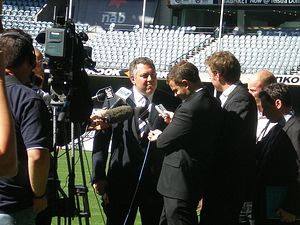Australians may have had their Christmas early with victory in the Ashes cricket tournament against England, but Treasurer Joe Hockey has refused to deliver any budget presents.
Announcing Tuesday the Australian government’s mid-year economic and fiscal outlook (MYEFO), Hockey played Ebenezer Scrooge instead of Santa Claus in calling for tough action to avert a threatened A$123 billion ($109.5 billion) budget blowout and a potential rise in gross public debt to A$667 billion in ten years.
Forecasting a A$47 billion budget deficit for fiscal 2014 compared to the previous A$30 billion projection, the treasurer said the budget had worsened sharply compared to previous estimates, hit by softer economic growth as well as policy decisions.
“The budget position since the pre-election economic and fiscal outlook, released on August 13, has deteriorated by $68 billion over the forward estimates,” he said in a statement.
“In the absence of any policy changes from what we have inherited, the budget would not return to surplus within the 10-year medium-term projections. During this time, gross debt on issue is projected to increase to $667 billion. The budget the Coalition has inherited is simply unsustainable.”
Hockey said Australia’s real gross domestic product (GDP) growth forecast had been downgraded to a below average 2.5 percent a year through to fiscal 2015, due to a “sharper-than-forecast fall in resources investment and a slower recovery in the non-resources sectors.”
The center-right Coalition treasurer blamed the previous Labor government for “historic debt and deficits,” accusing it of placing the budget in structural deficit due to profligate spending.
He warned the nation to brace for further reforms aimed at rectifying the budget deficit, based on a pending National Commission of Audit review of government spending.
“Taxpayers can no longer afford old government spending priorities,” he said. “Australians will now have to adjust their expectations of what government can sustainably provide, otherwise our nation’s prosperity and our people’s quality of life will be at risk.”
After both sides of politics had previously pledged a budget surplus by fiscal 2017, the MYEFO instead predicted continued deficits through to 2024 without any policy changes. It said net debt would peak in fiscal 2019 at 16.2 percent of GDP, its highest level since 1997, although still very low by comparison to other major economies.
Welfare State Threatened
On the chopping block for next May’s budget are reportedly “middle-class welfare” such as the childcare rebate and family payments, as well as education, disability and healthcare spending, which have contributed to an A$11 billion blowout in social spending over four years.
A predicted rise in unemployment to 6.25 percent is also expected to hit the budget bottom line to the tune of A$3 billion, while slower economic growth curbs revenues.
Yet with MYEFO attributing more than half of the current financial year’s A$17 billion blowout due to Abbott government decisions, Shadow Treasurer Chris Bowen said the previous Labor government could not take all the blame.
“MYEFO confirms peak debt rising to $460 billion and the budget balance deteriorating by $68.1 billion in just three months – including additional spending of $13.7 billion in just 101 days since the government was elected,” he said in a statement.
The MYEFO noted that Coalition decisions since its election had worsened the deficit, including an A$8.8 billion injection into the central bank, the scrapping of the carbon and mining taxes, extra schools funding and other policy changes, as well as its proposed A$22 billion paid parental leave scheme.
Business Warning
Business Council of Australia chief executive Jennifer Westacott called for a “re-prioritization of expenditure” and for all sides of politics to be “honest with the Australian community about the cost of government programs and what is likely to be affordable”.
While Hockey said the government would maintain its pre-election pledges not to cut education, health or defense expenditures, he said “all options are on the table” when examining other areas of spending.
Unlike his predecessor Labor treasurers, Hockey refused to commit to a budget surplus, instead saying he hoped to achieve the goal.
But while business economists warned of the threat to consumer confidence caused by the debt figures, the market reaction was muted. The Australian dollar and stocks showed little change following the announcement, while credit-ratings agencies said the nation’s AAA rating remained intact.
“Other than the current year’s forecasts, we do not see any of the figures presented today playing out, given they will be altered by corrective policy action in May following the recommendations of the Commission of Audit,” ANZ economists said in a research note.
“These revisions will be targeted at returning the budget ‘to sustainable surpluses that build to at least 1 percent of GDP by 2023-24.’ Consequently these forecasts mean little for markets or the [Reserve Bank of Australia], which will be more interested in the deliberations of the US Federal Reserve at its meeting this Wednesday.”
Hockey may not have stolen Christmas, but for a nation used to celebrating its good fortune, the latest budget numbers have shown that good times do not last forever.

































